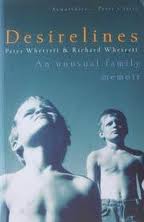Important Articles
Peter Wherrett (a.k.a. Pip Wilson) 1936-2009
This article was written by Christine Parker (#704)
Introduction
|
In this article, I will discuss Pip's two books, but first, I will start with my contact with Pip in the last two years of her life. You will notice that I flip between using the names Peter and Pip, as well as both gender pronouns, depending whether I am discussing the public or private persona. This is deliberate. |
It was quite some years ago that Peter Wherrett, famous for his television motor shows, Torque and Marque, came out publically as a cross-dresser when he and his younger brother, Richard, wrote their autobiographical book, Desirelines. Like most young rev-heads of the 1970's, I was a big fan of his television series and was as surprised as anyone else that he had come out as a cross-dresser. I simply could not imagine such a macho character being dressed as a woman. Later I discovered that Pip had been one of the early members of the NSW Seahorse Club in the 1970's. |
My contact with Pip
|
When I exited the closet in 2007, I soon found that Pip was active on an Australian cross-dressing forum and was amazed to see what a surprisingly feminine appearance that she had achieved in her photos dressed as a woman. I also became aware that she had recently moved to the Lake Macquarie area and was living just a 15-minute drive from me. Somewhat nervously, I sent her an email and we organized to meet at her new home. Wanting to make a good impression with this famous icon of motoring and cross-dressing, I arrived at the organized time to find she was not yet at home, however, she arrived a little later from a shopping trip, but to my surprise, she was in boy-mode. She appeared slightly miffed about my punctual arrival and unhappy that she would not have a chance to dress as it would take an hour to do so and she did not really feel like doing that. "That's OK", I reassured her, to which she rather abruptly replied, "No, it's not!" Fortunately, I had brought along a welcoming gift of a rather expensive bottle of Australian sparkling wine and her manner quickly turned to one of gratitude and appreciation. We spent the next couple of hours talking about our lives, and she seemed, as she had described herself in her on-line profile, "interested and interesting". However, I did find that she tended to get annoyed quickly, if she perceived some political incorrectness on my part, for example, when I referred to someone as a "typical cross-dresser", I suddenly received an irritated lecture on the wrongfulness of classifying people into categories of "cross-dresser" or "transsexual". Respecting her age, wisdom and experience, I took that on the chin and did not take offence. |
Otherwise, she was a delightful hostess, cooking dinner for me and another girl who arrived sometime later. Pip did tell me briefly about her diagnosis of prostate cancer and I was a little surprised that she had stopped taking Androcur, which I knew was prescribed for advanced prostate cancer. My subsequent contacts with her were at several social functions and I found her to be often irritated and quite blunt. At a weekend away at Kangaroo Valley in June 2007, she looked unwell, was clearly in pain, but reacted to this with irritability and sarcasm. She mocked my amateurish attempts at applying nail polish, something that I was still learning to master. I decided that I did not really want to pursue a friendship her after that and our future contact with infrequent and superficial. Some of my friends, who had met her, reported similar experiences to mine. There is a saying, "You should never meet your heroes... you'll only be disappointed." This seemed very relevant after meeting Pip. At the Seahorse Ball of 2008, Pip looked quite unwell and had lost a considerable amount of weight. I was in the foyer when the ambulance crew were taking her out to be transported to hospital much to the distress of her good friend, Linda-Karen. Her health deteriorated rapidly over the next six months and it was no surprise that she died from the cancer in March the following year. Her adult children specifically banned her transgender friends from attending what ended up a private family funeral. |
|
I decided to write this article to present a critique of her two books, The Gender Trap and Desirelines, both of which I delayed reading until recent months, but their availability in our newly revamped library (thank you, Lucie and Amy, for the great work), spurred me to read both of them. I felt it was important to preface this with my own experience interacting with Pip. |
The Gender Trap

I read Pip's last book, The Gender Trap, first. At the outset, I was puzzled by the use of the word "Trap", which seemed to me to have negative connotations, and even after finishing the book, I was still puzzled by the title. The presentation of the book looked rather cheap and roughly done, with the use of an unusual and hard-to-read Teletype font and a surprisingly high number of typos. While some of the book was written by Pip, many chapters were lengthy verbatim accounts from people that Pip had interviewed, including a friend who I was easily able to identify from her story and who told me later that she was surprised that Pip had included the entirety of her story. Other stories tended to rather repetitive and frankly rather boring in their narrative, especially a lengthy account from an unhappy, non-accepting spouse of a Scottish transgender person. |
However, other chapters of the book, penned by Pip herself, were well written, very insightful and highly observant of cross-dressing behaviour, as one might expect from one who had had such long-term involvement in our community and who was also a professional writer. I particularly like the section on the "doors" that cross-dressers had to pass through during their life span in our unusual world. I could easily identify with these and found the analogy very apt and meaningful. There were some references to Pip's childhood and father, which I found were greatly expanded upon in her earlier book. |
Desirelines
 Reading Desirelines was a totally different experience in so many ways. It looked far more professionally produced and its focus was on accounts by the brothers, Peter and Richard, one of Australia's most successful theatre directors. It tells of their lives, but especially detailing their growing up in the Wherrett family. Of particular relevance, was Peter's relationship with his father, who was severely alcoholic and abusive. Peter discovered that his father was a very active cross-dresser, whose behaviour was very much calmer when he was dressed. When not dressing, his father would get drunk and be violent to their mother. Their mother knew of her husband's cross-dressing and was apparently supportive of it in an era when that must have been most unusual. The book opens with a dramatic account of a rare episode where Peter and his father experienced closeness, while beach fishing in northern NSW. The brothers alternate chapters with their accounts of the family lives and subsequent development into adulthood. |
I read with fascination Peter's story of his first foray outside the house, as a 17 year old, dressed as a woman, interestingly in his father's female clothes. That closely matched my own experience at the same age. Also I could identify with the difficulties of growing up with an abusive alcoholic father. While Peter was 12 years older than me, there were many similarities in our lives. While Richard's chapters were perhaps not as relevant to me, they were nonetheless very well written and interesting. Again, I identified with the stories, having a younger gay brother who would have known Richard and who has been HIV positive for more than 25 years. Sadly, Richard died in 2001 of the disease. Richard directed many plays, including the very successful The Elocution of Benjamin Franklin, in which the sole character is a cross-dressing elocution teacher, played by that great Australian actor and comedian, Gordon Chater. I saw it many years ago and enjoyed it immensely. Peter was consulted about various aspects of cross-dressing during the writing and production of the play. Reading this book left me with a far greater understanding of Pip as a person and went a long way to giving me insight into her own tendency to intolerance and rudeness. She openly admitted to these faults in Desirelines and I was more forgiving of her after reading this book. |
In conclusion
May she rest in peace, for she had little peace in this life.